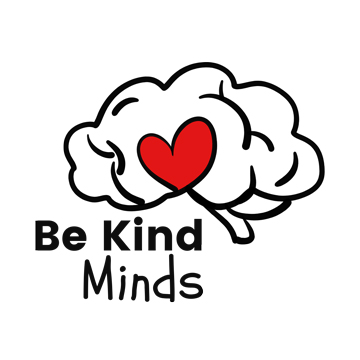
Growing up as a child, I cried wildly for my mother every time she left to run an errand and I was left at home with others – I felt insecure without her. Every night without fail, I would always crawl out of bed and walk to her room to “tell mommy something”, waking my brother up who shared a room with me, and my Dad who was asleep next to my Mom – my emotions were intense even as a small human…
As I grew to be a young teenager, my emotions magnified as I entered a new stage of development. My feelings crushed when I was told I was ‘too fat’ for any guy to like me, ‘too much’ to handle as a friend and my “best friend” broke up with me via a letter in the mail – telling me she never wanted to talk to me again…


Further into my teenage years, life became “too much” for my new best friend, who was also told he was “too much” for others—too sensitive, and he needed to ‘man up’… sadly he chose to end his life my Junior year of high school. My emotions intensified further and anger became my emotion of choice when sadness became too exhausting. I hated myself even more — what was wrong with me, that people felt they had to leave? My feelings exploded in front of others as I was easily triggered into feeling shame, embarrassment, confusion… I was vulnerable to falling apart at the slightest touch.
The phrase “too sensitive” is born out of ignorance or a lack of understanding of ones own emotions, or the emotions of a loved one, friend, co-worker or classmate. It’s misunderstood and therefore received as a sentiment of shame; like you must be broken – because your emotions are falling out of the social acceptable ‘norm’.

What I wish to illustrate in this article is an introduction to a new perspective of what it means to be “too sensitive”. That rather than it being a bad thing to swing extra high, or swing extra low, these magnified feelings are just that— they are heightened, normal, emotions. It is a GOOD thing to FEEL emotions, so long as you utilize this GIFT for good.
What Does Being “Too Sensitive” Look Like?

Being “too sensitive” most often roots from a Mental Health condition, like depression, anxiety, bipolar disorder, ADHD, and a host of other diagnosis. I can only speak from my personal experience, and studies. I encourage you to further your studies by visiting Amen Clinics website for more information, or other related websites for helpful and educational resources on Mental Health Conditions. Dr. Amen’s belief is that nothing is beyond healing (improving your health), with proper treatment.

It’s difficult to say how long I’ve had Bipolar 1 disorder, and ADHD (I was officially diagnosed at the age of 31), but from a very young age my emotions have always been unusually intense. I was constantly told I was “too sensitive” when I would react to criticism, bad news, teased, and called out on anything… When I was sad, I was very sad and my feelings took me into a very dark place in my mind. When I was angry – I was explosively angry, and the moodiness just stuck around and was difficult to ‘let go’. When I felt anxious, I would break down crying at the thought of facing my fear – it felt debilitating – I couldn’t move; whether it was going to girls camp when I was a young teen, or just getting in the car to go to the grocery store as a grown adult. My feelings were very real – they hardly ever made sense, and they were overwhelming me. I didn’t understand. And what was worse, is I knew those around me didn’t understand. I felt broken, and I was convinced I was a burden not worth having around. That’s a dangerous place to be.
Individuals who are most commonly told that they are “too sensitive” are those who live with a chronic mental health condition, which has no cure – but the symptoms can be successfully managed with proper treatment and therapy so you can live a more ‘normal’ life…
These conditions I’m highlighting below, those who live with these diagnosis are often referred to as being ‘too sensitive’. Hopefully with a better understanding of the root cause of the ‘extra sensitive nature’, there can be more compassion given to the individual, or to ones self:
Symptoms and behaviors of Bipolar 1 disorder look like:

Think of your emotional processing like a bowling lane. A ‘normal’ healthy brain has bumpers on each side that keep your emotions intact or within a ‘normal’ healthy and expected range. The bipolar brain lacks those helpful bumpers, so when the [normal] emotion gets triggered, it often swings off the lane into an exaggerated or extreme level of the emotion, sometimes out of control. So when you love – you love intensely. When you get sad, you get really sad (sometimes to the degree in which you crave the relief of not living anymore). When you get frustrated – you feel infuriated – so much you want to break things (i.e. punch a hole in the wall).
The person who has bipolar disorder needs proper treatment to learn how to build their own ‘bumpers’, and hold those in place when managing and expressing their emotions. It takes extra mental effort to ‘keep those normal emotions and behaviors in their proper ‘normal’ range, which often is an exhausting daily task, and why most people you know who have bipolar disorder are often tired and sometimes slow to get things done.
Some (not all) symptoms specific to bipolar disorder:
- Abnormally elevated mood
- Inflated self-esteem
- Grandiose notions, ideas, or plans
- Increased talking or pressured speech
- Racing thoughts
- Inability to “turn off the mind”
- Poor judgement that leads to risk-taking / impulsive behavior
- Irritability or aggression
- Delusions or hallucinations
- [learn more here] and refer to symptoms of depression and anxiety below, which is part of the ‘bipolar package’.
Symptoms of Depression often look like:
Depression often partners with anxiety (statistically 75% of the time they will occur together), one will often trigger the other, or symptoms will be manifested at the same time. There are several variations or types of depression, but the following are the typical symptoms and behaviors you’ll find in someone who struggles day to day with depression:
- Cancelling plans / wanting to be alone
- Sleeping too much or too little
- Persistent sad or negative mood
- Loss of interest in usually pleasurable activities
- Feelings of guilt, worthlessness, helplessness, hopelessness, or pessimism
- Appetite changes and/or weight loss or weight gain
- Notable decrease in energy or feeling “slowed down”
- Thoughts of death or suicide, or suicide attempts
- Difficulty concentrating, remembering, or making decisions
- Persistent physical symptoms (such as headaches, digestive problems, or chronic pain)
- Chronic low self-esteem
- Persistent feeling of being dissatisfied or bored
Symptoms of Anxiety often look like:
- Avoidance of people or places due to a fear of having an anxiety or panic attack
- Panic attacks
- Symptoms of heightened muscle tension (headaches, sore muscles, hand tremor)
- Periods of heart pounding, nausea, or dizziness
- Tendency to predict the worst
- Multiple persistent fears or phobias
- Conflict avoidance
- Excessive fear of being judged or scrutinized by others
- Unnecessary guilt / apologizing multiple times
- Being easily startled or a tendency to freeze in anxiety-provoking or intense situations
- Shyness, timidity, and getting easily embarrassed
- Biting fingernails or picking skin
Over-focused Anxiety / Depression looks like:
- Obsessive-compulsive disorder (stuck on negative thoughts or actions)
- Phobias (stuck on fear)
- Eating disorders (stuck on negative eating behavior)
- Posttraumatic stress disorder or PTSD (stuck on a past traumatic event)
[Learn more about Depression and Anxiety here]
Symptoms of ADHD can look like:
Dr. Daniel Amen has broken down ADD into Seven Types, but we’ll go over a shorter summary of the core and most common symptoms and behaviors:
- A short attention span for everyday tasks (i.e. chores)
- Distractibility
- Procrastination
- Organization problems
- Problems with follow-through
- Poor impulse control (i.e. speaking before thinking)
- Restlessness / Being fidgety
- Talking excessively / Bad habit of interrupting others
- Forgetfulness
- Excessive or senseless worrying
- Tendency towards compulsive behaviors
- Difficulty shifting attention from subject to subject
- Needing to have things done a certain way or they get upset
- Oppositional and argumentatitve
- Explosive anger
- Sensitivity or mild paranoia
[Several more symptoms and behaviors of ADD can be found here]
How Can Being “Too Sensitive” Be A Good Thing?
After reading those lists above, you may be thinking “how is this a good thing?” Especially when you know managing these extra intense emotions and behaviors are exhausting, often times embarrassing, or overwhelming… but when managed correctly, having extra of a positive emotion can be used for good. Being able to speak from experience on the unfortunate and difficult feelings (i.e. grief, depression, etc) can be an added benefit when comforting others.
The world is full of so many colors, so much beauty in nature. It is said that there are colors that our human eyes cannot yet see or comprehend. Some believe that in the next life, as we evolve into a greater version of ourselves, we’ll all be able to see these colors we cannot even begin to imagine are possible to exist.
It’s difficult for most people who do not have a mental health condition to comprehend what it feels like to have all these extra intense “colorful emotions”. It’s impossible for us who do live with these conditions to describe what it feels like— there are no words, in a single language, to express the feelings and thoughts, and dimensions these feelings and emotions take us. So with that understanding, it’s important that we not be frustrated when others have a difficult time understanding our emotions and behaviors at times, and it’s equally important that we not be frustrated with ourselves.
What we can do is use these colorful emotions, the colors of emotions that live outside the spectrum of the rainbow, and use them to paint a more beautiful world. We can use these gifts for good to help others.
Our Call to Action to Use Our Gifts
Right now while the world is experiencing a pandemic, more than any other time in history has society been able to empathize, and have the opportunity to empathize with those who struggle with a chronic mental health condition. Those with healthy brains are experiencing day to day stress that isn’t as easy to shake off; anxious feelings, and persistent feelings of sadness due to covid guidelines and ‘stay at home’ orders. This ‘too much too fast’ trauma has forced people to experience, even at a small degree, what it feels like to live with a mental health condition. With this experience we have a calling, and obligation to have a greater compassion and understanding for one another as we need each other for comfort and support to help pull through these unusually difficult times.
An undiagnosed mental health condition, especially those of a greater intensity and risk, can be destructive and quickly get out of control. That’s when “too much” can be a danger. But in most cases, with correct treatment and therapy, you can manage your “too sensitive” emotions, which are a gift, and can be used to help others. 💚
If you or a loved one is feeling suicidal, or you may feel they, or you, might be a danger to yourself, please call 911 or reach out to the National Suicide Prevention Lifeline: 1-800-273-8255…
